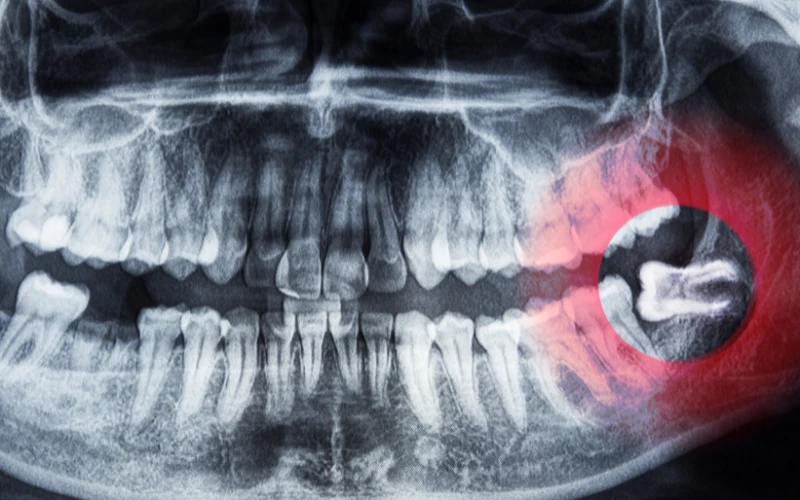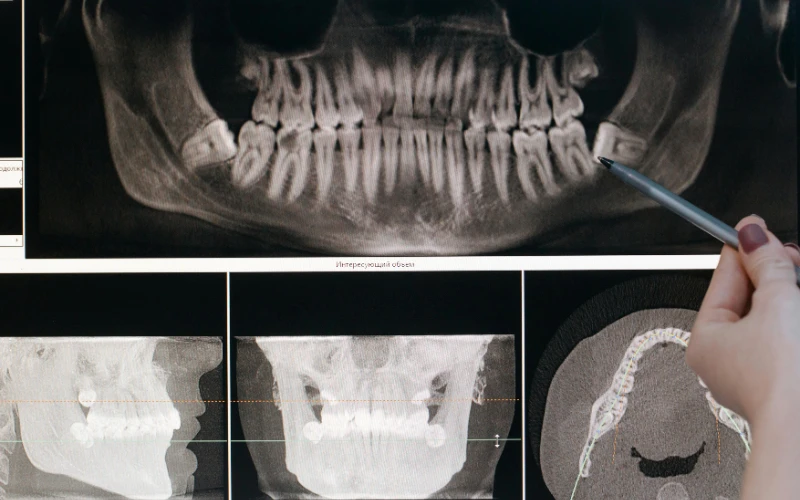Signs Your Wisdom Teeth Are Coming In
The final molars, wisdom teeth, appear in late adolescence or early adulthood. Some people have no problems when these teeth come in, while some do. Early detection of wisdom teeth can avoid pain, swelling, and infection. Understanding these symptoms helps you decide whether to get wisdom tooth treatments to prevent oral health complications.
What Are Wisdom Teeth?
Final molars are wisdom teeth in the back of the mouth. Thus, they are called “third molars.” They usually appear between 17 and 25. These teeth helped our ancestors chew difficult meals like raw plants and meat. Wisdom teeth purpose was mainly to grind tough food. However, what does it look like when your wisdom teeth are coming in or what does it look like when wisdom teeth come in can vary from person to person. Wisdom teeth are generally useless due to contemporary diets, smaller jaws, and better dental hygiene.
For many people, the mouth is too small for these teeth to grow in. Wisdom teeth may not fully emerge from beneath the gums or may come in at an angle if there is not enough space. This can cause pain, swelling, infections, and surgical removal.

Why Do We Develop Wisdom Teeth in the First Place?
Our evolutionary past left us with wisdom teeth, or third molars. Our ancestors used these extra molars to crush tough, uncooked things like roots and meats. Since our diets and food preparation processes have changed, these teeth are useless today.
Wisdom teeth usually appear between 17 and 24. Late eruption can cause problems, especially if the mouth is too small for the teeth to fully emerge.
According to research, a deficiency of vitamin K2 in modern diets may underdevelop the jaw, making wisdom teeth less likely to form. Reduced breastfeeding and a soft diet in infancy may also cause jaw underdevelopment. But does everyone have wisdom teeth? Not necessarily, some people never develop them at all.
Common Early Symptoms That Your Wisdom Teeth Are Erupting
The emergence of wisdom teeth may be indicated by many oral signs. These first signs of wisdom teeth coming in differ by tooth position and available room for growth.
Look for these common early wisdom teeth symptoms:
- Tender or Swollen Gums: When wisdom teeth come in, the skin around them may become sore, red, or swollen.
- Jaw Swelling: Jaw and cheek puffiness or stiffness may result from erupting teeth.
- Pain or Discomfort: The back of your mouth may hurt if your wisdom teeth are moving up.
- Difficulty chewing or biting: New teeth may change your bite or exert pressure on neighbouring teeth, causing discomfort.
- Bad Breath or Taste: Food particles trapped around partially erupted wisdom teeth might cause bacterial accumulation and odour.
- Headaches or Ear Pain: When teeth erupt, they can put pressure and pain on nearby areas, like headaches and earaches.
- Fever or Swollen Lymph Nodes: Trapped germs might cause mild fever or enlarged lymph nodes.
What Does Wisdom Tooth Pain Feel Like?
Wisdom teeth emergence pain depends on space and tooth position. Wisdom tooth growing in discomfort usually feels like this:
- A dull, constant ache is typically felt in the back of the mouth near the erupting wisdom teeth or along the jawline.
- Chewing increases throbbing discomfort due to tooth growth pressure.
- Tenderness or soreness, common in gums, particularly when teeth are breaking through the gum line; this is often what do wisdom teeth feel like when erupting.
- Wisdom teeth erupting can cause jaw stiffness or discomfort, making mouth opening difficult.
- Headaches or earaches; do wisdom teeth hurt coming in? Yes, they can cause pressure, radiating pain, and discomfort.
How to Tell If Your Wisdom Teeth Are Coming In Properly or Not

If you’re wondering how to know if your wisdom teeth are coming in, how to know if wisdom tooth is coming in, or how to know if my wisdom teeth are coming in, these points will help. Improper wisdom tooth eruption can cause pain, infection, and misalignment, so watch them carefully. Here are some signs that your wisdom teeth are coming in properly:
- Swollen or Red Gums: Inflamed gums may indicate wisdom teeth difficulty breaking through the gum line. The developing tooth may cause swelling from pressure.
- Tender or Bleeding Gums: When wisdom teeth emerge, they may cause some discomfort, soreness, or bleeding. This often indicates gum pressure from tooth growth.
- Jaw Pain: If you experience jaw pain or discomfort near the wisdom tooth, it may indicate that the teeth are not coming in smoothly. This pressure might also alter biting alignment.
- Bad Breath or Taste: Partially erupted wisdom teeth can trap food and bacteria, causing bad breath or a foul taste. This may indicate impacted teeth.
- Facial Swelling: Impacted wisdom teeth may cause facial swelling, particularly near the teeth erupting. This usually happens when teeth can’t fully erupt.
- Frequent Headaches: Wisdom teeth pressure can cause headaches, particularly if they are not positioned properly. Jaw tightness may also cause this.
Your wisdom teeth may be coming in at an unusual angle or are impacted if you suffer difficulties or pain when opening your mouth fully.
At What Age Do Wisdom Teeth Usually Come In?
What age do your wisdom teeth come in? Wisdom teeth usually appear between 17 and 25. Age can vary greatly between people. Stay careful during this period, since wisdom teeth may come in earlier or later.
Regular dental health monitoring can alert you to discomfort, swelling, or misalignment so you can consult a dentist.
How Long Does Wisdom Tooth Pain Typically Last?
Do wisdom teeth hurt when they come in? The answer is yes, the pain can last for different amounts of time. Some people have pain for days or weeks, while others have it for months. Some feel acute, throbbing pain, while others sense slight discomfort.
Remember that the pain usually subsides as the teeth erupt. Talk to a doctor if the pain doesn’t go away or gets worse. Dental experts can look at the issue, find problems, and suggest a way to treat the pain.
How Early Can X-Rays Detect Wisdom Teeth Growth?
Wisdom teeth development can be identified by dental X-rays at the age of 10–12. A panoramic X-ray may show wisdom tooth buds at this stage.
X-rays are critical tools for assessing the presence, placement, and development of wisdom teeth. To check tooth growth and angulation, dentists suggest panoramic or periapical X-rays. These images let dentists assess wisdom tooth size, position, and orientation before they emerge.
Why Wisdom Teeth Often Cause Pain or Discomfort?
Wisdom teeth can cause severe pain and discomfort due to various common eruption reasons. The main reasons:
- Impaction: Wisdom teeth may grow at strange angles due to insufficient space for full emergence. This could put stress on nearby teeth, making the pain last for a long time. Most of the time, wisdom tooth pain is caused by impaction.
- Partial Eruption: Wisdom teeth may partially emerge through the gum. This can cause gum tissue flaps that trap food and bacteria, causing infection. One of the most prevalent reasons of wisdom teeth pain is infection, which produces swelling, stiffness, and pain around the partially erupted tooth.
- Tumours or Cysts: Impacted wisdom teeth might cause cysts or tumours. These growths can damage nearby teeth and jawbone, causing discomfort and tissue deterioration if left untreated.
Effective Ways to Relieve Wisdom Tooth Pain at Home
There are several home remedies for wisdom tooth pain while waiting for surgery or developing wisdom teeth:
- Rinse with Salt Water: Add 1/2 teaspoon of salt to a cup of warm water and rinse your mouth. This cleans, reduces inflammation, and speeds healing.
- Apply a Cold Compress: On the outside of your cheek, put a cold pack or a bag of frozen peas covered in a towel. This reduces swelling and momentarily numbs pain.
- Take OTC Pain Medication: Ibuprofen or acetaminophen can reduce inflammation and ease wisdom teeth eruption pain. Use the indicated dose.
- Use Clove Oil: Clove oil has natural numbing effects that can temporarily relieve pain. Put a little clove oil on the affected area with a cotton swab.
- Eat Soft Foods: These are the best food to eat after wisdom teeth removal or when wisdom teeth coming in cause soreness.
- Maintain Good Oral Hygiene: Use a toothbrush and floss to clean the area around your wisdom teeth to keep food from getting stuck and to prevent infection. Be very careful not to irritate anyone.
When You Should See a Dentist About Wisdom Teeth Pain
Consult a dentist if your wisdom teeth are causing serious pain or other complications. Too-long delays can cause infections, cysts, and tooth damage. Signs you need a dentist:
- Constant or severe pain
- Significant swelling or pus
- Difficulty opening your mouth due to jaw stiffness.
- Fever or lymph node swelling
- Teeth shifting or crowding
If any of these occur, see a dentist for an evaluation and treatment.
When Wisdom Teeth Need to Be Removed — And What to Expect
In some cases, wisdom teeth must be extracted. Wisdom teeth removal may be recommended if they’re causing problems or anticipated to cause problems. Here are some typical wisdom teeth coming out reasons:
- Impaction: Insufficient room for wisdom teeth emergence can cause impaction. Extraction is needed to treat discomfort, infections, and gum damage from impacted wisdom teeth.
- Crowding: Wisdom teeth that grow at angles or brush against neighbouring teeth can crowd and misalign. They may need to be removed for dental alignment and orthodontic safety.
- Decay or Gum Disease: Difficulty cleaning wisdom teeth might cause decay or gum disease due to their placement. To prevent further harm, removal may be advised if these symptoms persist despite proper dental hygiene.
- Cysts or Tumors: Rarely, wisdom teeth may develop growths that damage surrounding bone and teeth. Avoiding major consequences requires early removal.
With fully erupted teeth, extraction is usually easy. Your dentist or oral surgeon may propose local anaesthesia or sedation depending on the complexity of your case. The surgery may cause swelling and discomfort, which can be treated with medicines and cold compresses.
If you think your wisdom teeth need to be pulled, talk to your dentist.
How to Protect Your Oral Health During Wisdom Tooth Growth
To avoid issues, intervene early if you or your teen has wisdom tooth symptoms. Steps to protect your dental health during this time:
- Schedule a Dentist Consultation: Schedule a dentist appointment immediately if you have any of the usual symptoms, such as pain or swelling. Early screening can establish if extraction or other treatments are needed.
- Monitor Wisdom Teeth Eruption: Healthy, functional wisdom teeth may not need removal. However, impacted teeth can cause pain, infections, and crowding. Your dentist can help you manage these difficulties.
- Consider Early Removal: Wisdom teeth are simpler to remove before 20 due to their undeveloped roots. Discuss the appropriate treatment with your dentist if your teen is in pain.
About Our Dental Practice and Wisdom Tooth Expertise
Dr. Emre Yılmaz and Dr. Aylin Çelik have over 30 years of experience in providing outstanding dental care, specialising in wisdom teeth extraction. Their primary team runs Teeth Implants Turkey, which provides innovative oral health solutions.
At Teeth Implants Turkey, we specialise in wisdom tooth extraction and provide high-quality care to ensure a comfortable experience. Our expertise in advanced dental procedures keeps you secure.
Visit Teeth Implants Turkey to learn more about wisdom teeth coming in, what does a wisdom tooth coming in look like, and how do I know my wisdom teeth are coming in.














